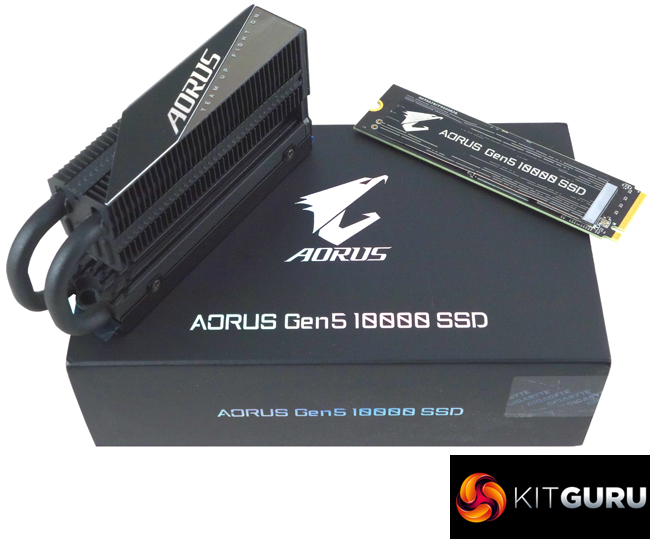Motherboard manufacturers have been proudly boasting about having motherboards with PCIe 5.0 supporting M.2 slots for a while without there actually being anything remotely Gen5 to stick in them. Well all that changes with the launch of Gigabyte's AORUS Gen5 10000 SSD. What's with the “10000” part of the name you might ask, ah well that's the official maximum Sequential read rating for the drive, well for the 2TB drive to be exact, 10,000MB/s. The official Sequential write figure for the 2TB drive is pretty impressive too, up to 9,500MB/s.
The drive is built around a combination of a Phison controller and Micron NAND with 4GB of LPDDR4 cache thrown in for good measure. The Phison PS5026-E26 is the first consumer Gen5 controller to market and has been designed to support current and future types of 3D NAND memory featuring ONFI 5.X and Toggle 5.X interfaces with transfer rates of up to 2400 MT/s. The drive also supports the NVMe 2.0 specification.
Built on a 12nm process using dual Arm Cortex-R5 cores together with Phison’s CoXProcessor 2.0 accelerators the 8-channel controller can support up to 32TB of TLC and QLC NAND flash memory and is the first Phison controller to ship with the companies I/O+ Technology that amplifies the solution's ability to perform at high levels under severe sustained workloads that otherwise cause a drive real problems. The drive uses the latest Micron (B58R) 232-layer 3D TLC NAND.

At launch, the AORUS Gen5 10000 comes in just two capacities, 2TB and 1TB. As noted above the 2TB drive is rated at up to 10,000MB/s and up to 9,500MB/s for reads and writes respectively. The 1TB drive makes do with up to 9,500MB/s for reads and up to 8,500MB/s for writes. There is no mention of random performance on the drives spec sheet but the PS5026-E26 controller supports random 4K speeds of up to 1,500K IOPS for reads and up to 2,000K IOPS for writes.
Using the ATTO benchmark we couldn't quite get to the maximum Sequential read figure of 10,000MB/s with a test result of 8,980MB/s. However, the tested write result bettered the official 9,500MB/s figure producing a figure of 9,540MB/s. Using the default CrystalDiskMark 8 benchmark we could confirm and even better the official ratings, reads a little and writes a fair bit. The default read result was 10,087MB/s while the write result of 10,216MB/s bettered the official maximum by 676MB/s.
The best random performance we saw came from the Peak Performance profile at 1,494K IOPS for reads and 1,733K IOPS for writes. The settings for this test part of the test profile really push the drive, with a queue depth of 32 using 16 threads so it's pretty extreme. The Real World profile uses a QD of 1 with a single thread and this produced a not-very awe-inspiring read result of 20,905 IOPS with writes at 80,209 IOPS.
Bundled with the drive is the M.2 Thermal Guard XTREME dual heat pipe cooler. This is an impressive beast of a cooler and one that's so big (92 x 23.5 x 44.7mm (LxWxH)) that very careful measurements have to be taken to see if can be installed. To give an idea of how big it is we had to change the CPU cooler we were going to use to a slightly smaller one to make sure it would fit, even then it was pretty tight fit.
When it comes to Sequential performance the Gigabyte AORUS Gen5 10000 is miles ahead of its Gen4 competition but in some of our 4K random testing, the gap between Gen4 and Gen5 drives isn't as big as one might expect. In fact in the CrystalDiskMark 8 4K QD1 1 Thread test the Gigabyte drive lies in third place for random reads behind the heatsink editions of Lexar's Professional NM800PRO and WD's Black SN850X Gen4 drives.
We found the Gigabyte AORUS Gen5 1000 on Tekshop247 for £332.62 inc VAT HERE
Pros
- Extremely fast Sequential performance.
- PCIe 5.0 interface.
Cons
- Needs a PCIe 5.0 M.2 slot to get the best performance.
- Use of the bundled heatsink needs careful planning.
- Some random performance results a little lacklustre.
- Pricey.
Kitguru says: Gigabyte's AORUS Gen5 10000 offers blazingly Sequential speeds both for reads and writes but the random performance in some scenarios isn't as impressive. But it's very early days for the Gen5 interface and no doubt there will be firmware tweaks to come as well as more optimised NAND to team up with the Phison E26 and any other controllers to come.
Be sure to check out our sponsors store EKWB here
 KitGuru KitGuru.net – Tech News | Hardware News | Hardware Reviews | IOS | Mobile | Gaming | Graphics Cards
KitGuru KitGuru.net – Tech News | Hardware News | Hardware Reviews | IOS | Mobile | Gaming | Graphics Cards



